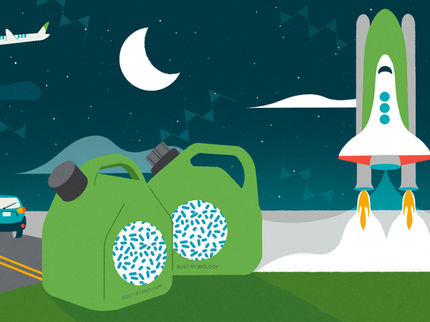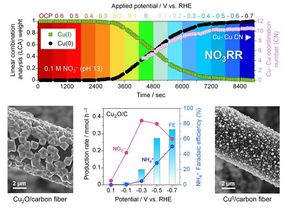Second generation biofuel from Clariant and Haltermann
Straw-based cellulosic ethanol guarantees significant reductions in CO2 emissions without competing with food production
Advertisement
A fuel of the future is being introduced to the streets in a fleet test launched by the joined forces of Clariant, Haltermann, and Mercedes-Benz. The Clariant sunliquid® process converts wheat straw into cellulosic ethanol. The company Haltermann then mixes the cellulosic ethanol with conventional fuel components to form the new fuel. The production of cellulosic ethanol is virtually CO2-neutral, saving almost 100 % of CO2 emissions when compared to gasoline. sunliquid®20 is 20 % cellulosic ethanol, i.e. the well-to-wheel comparison shows reductions in greenhouse gas emissions of around 20 % with consistent engine power. There is no competition with food production or for agricultural acreage. A high octane number (RON) of over 100 guarantees optimal efficiency.
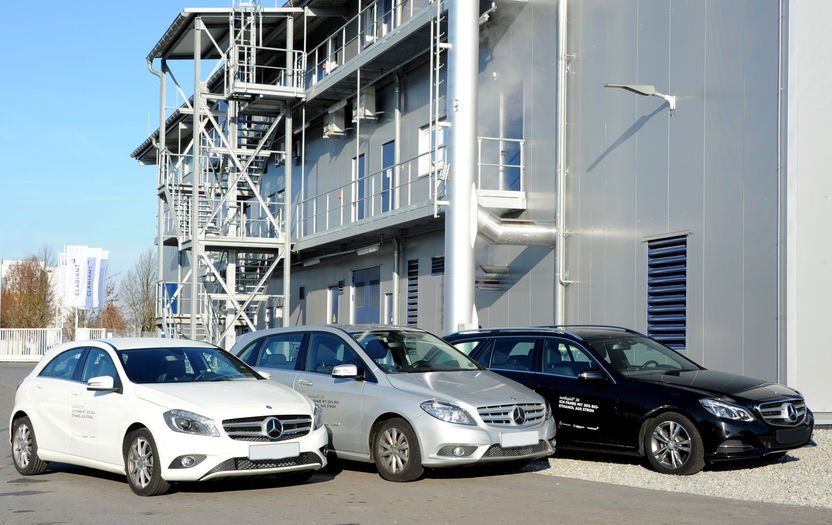
Mercedes-Benz fleet at Clariant's sunliquid® demonstration plant for production of cellulosic ethanol from agricultural residue.
Clariant/Rötzer
“Cellulosic ethanol is a genuinely sustainable and advanced biofuel of the latest generation. It is produced in Germany from agricultural residues. The fleet test will demonstrate that the fuel is ready for market and technically compatible with in series vehicles at a blending rate of 20 % with super gasoline. This shows that second generation biofuels based on agricultural residues are now technologically ready and available, not only in production but in application as well,” says Professor Andre Koltermann, Head of Group Biotechnology at Clariant.
Over the next twelve months, test fleet vehicles can be refilled with the new fuel at a specially equipped gas station on the Mercedes-Benz site in Stuttgart-Untertürkheim. The cellulosic ethanol comes from Clariant's sunliquid® demonstration plant in Straubing, where approximately 4 500 tons of agricultural residues such as grain straw or corn stover are converted into cellulosic ethanol each year. At the Haltermann plant in Hamburg the bioethanol is mixed with selected components to form the innovative fuel, the specifications of which reflect potential European E20 fuel quality.
Other news from the department research and development
These products might interest you
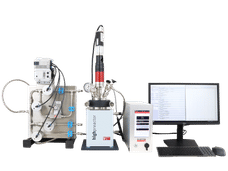 New
New
Fully automated hydrogenation reactor BR/H2 by Berghof
Fully automated hydrogenation reactor: Precise and safe hydrogenation at the flick of a switch
Optimised process control with leakage tests, gas consumption measurement and modular expandability
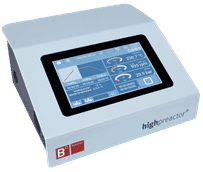
BRC - Berghof Reactor Controller by Berghof
BRC - complete package for data acquisition, storage and control of all process parameters
Touch controllers are easy to use and provide quick access to all important functions

Berghof Reactor Technology - High and Low Pressure Reactors, Pressure Vessels, and Metal-Free Reactors by Berghof
Safe high- and low-pressure systems for aggressive media
Corrosion-resistant reactors with PTFE lining - individually configurable

Get the chemical industry in your inbox
By submitting this form you agree that LUMITOS AG will send you the newsletter(s) selected above by email. Your data will not be passed on to third parties. Your data will be stored and processed in accordance with our data protection regulations. LUMITOS may contact you by email for the purpose of advertising or market and opinion surveys. You can revoke your consent at any time without giving reasons to LUMITOS AG, Ernst-Augustin-Str. 2, 12489 Berlin, Germany or by e-mail at revoke@lumitos.com with effect for the future. In addition, each email contains a link to unsubscribe from the corresponding newsletter.



